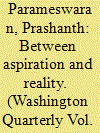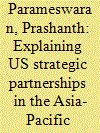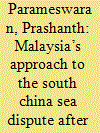| Srl | Item |
| 1 |
ID:
142996


|
|
|
|
|
| Summary/Abstract |
On October 20, 2014, Indonesia—the world's fourth-largest nation, third-largest democracy, and largest Muslim-majority country—after a decade of stable leadership under Susilo Bambang Yudhoyono, inaugurated former Jakarta governor Joko Widodo as its new president. Jokowi, as he is popularly known in Indonesia, will face the daunting task of addressing the country's myriad domestic problems, while also maintaining its role abroad as a regional leader in Southeast Asia as well as a global player in important international fora like the G20 and the United Nations. Indonesian foreign policy will likely display significant continuity with the Yudhoyono years. But in translating Indonesia's foreign policy aspirations into reality, Jokowi will confront major challenges ranging from nagging resource constraints at home to incomplete political transitions and rising nationalism among Indonesia's neighbors abroad. These challenges have profound implications for U.S. policy toward Indonesia, given the closer ties between the two countries over the past few years. U.S. policymakers should factor in these realities as they fashion next steps for U.S.–Indonesia relations.
|
|
|
|
|
|
|
|
|
|
|
|
|
|
|
|
| 2 |
ID:
134033


|
|
|
|
|
| Publication |
2014.
|
| Summary/Abstract |
Since the mid-1990s, strategic partnerships have emerged as a new form of alignment between states, particularly in the Asia-Pacific region. Yet only recently has the United States begun to pursue such relationships, especially under the Obama administration which has signed new partnerships with Indonesia, Vietnam, Malaysia and New Zealand. As a result, the current literature does not yet include significant study on how the United States views strategic partnerships. This article attempts to fill this gap by exploring the emergence of strategic partnerships as a new form of alignment in US strategy in the Asia Pacific under the Obama administration. Drawing on the existing literature on alignment, government documents, as well as conversations with policymakers from the United States and Southeast Asia, it argues that Washington is pursuing strategic partnerships as part of a deliberate effort to both enlist target countries to share the burden in addressing challenges and to institutionalize its relationships in the Asia Pacific. It constructs an original three-part analytical framework to understand how US policymakers conceive, craft and evaluate strategic partnerships in the Asia Pacific and applies it to analyse the similarities and differences in US partnerships with Indonesia and Vietnam.
|
|
|
|
|
|
|
|
|
|
|
|
|
|
|
|
| 3 |
ID:
149536


|
|
|
|
|
| Summary/Abstract |
Malaysia has traditionally adopted a “playing it safe” approach to the South China Sea designed to secure its claims while simultaneously ensuring that it preserves its important bilateral relationship with China. Ahead of the ruling by the Arbitral Tribunal on 12 July 2016, that approach had come under increasing scrutiny, given the bolder and more frequent Chinese encroachments into Malaysian waters as well as some other diplomatic incidents in the Sino-Malaysian relationship.
|
|
|
|
|
|
|
|
|
|
|
|
|
|
|
|